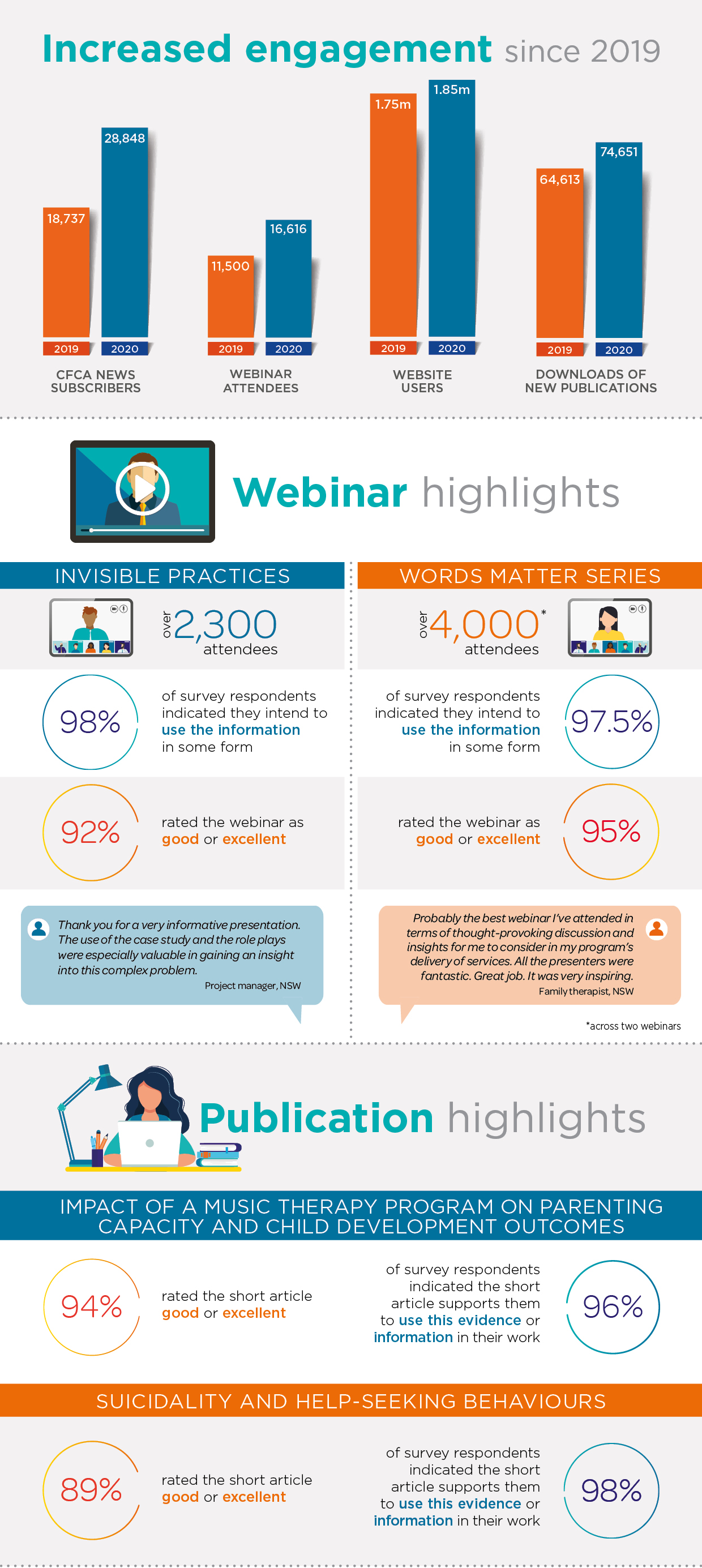CFCA in 2020: Supporting the sector through a year like no other
In 2020, Australian families faced multiple challenges with the combined impacts of drought, bushfires over the summer and then the COVID-19 pandemic. These crises have placed major strains on family life, relationships and livelihoods; which has had a significant effect on the child, family and community welfare sector responding to them.
Throughout this year, CFCA has been committed to adapting our work to meet your needs to ensure you have the evidence you need for your practice.
Changing how we work
As COVID-19 emerged in Australia, families went into lockdown. During this time, with life changing rapidly and sector events and conferences cancelled, online information, resources and professional learning became crucial for our sector.
In response, we adapted our fortnightly newsletter between April and July to highlight and share sector-specific COVID-19 resources and information. We received strong engagement with these external resources (53% of newsletter clicks during this period, compared to 15% in 2019).
In April, we produced our first remotely delivered webinar – Sadie’s Story; and quietly wondered if the internet would hold up in people’s homes or if you would have time to watch among the other demands of working from home. This webinar set a new CFCA record with over 2,000 attendees (compared to 915 attendees at our most popular webinar in 2019); and was then surpassed by the Invisible Practices webinar in July with over 2,300 attendees.
We also worked to bring you short articles and webinars highlighting how services were using evidence when adapting their practice: Preparing young people to leave care during COVID-19; Helping children in care stay in contact with their birth families during COVID-19; and The adaption of a national music therapy program for children and families during lockdown.
Recognising the increased appetite for accessing information online during this time, we rolled out new layouts to our webinars and papers – helping you to navigate the content more easily; and also adapted our short articles to provide a stronger focus on practice issues and synthesis of the relevant evidence and implications for practice.
Listening to your needs
This year, more than ever, it was crucial for us to listen to and understand your needs. We read emerging research and attended online events to learn about your changing needs through lived experience accounts. Additionally, in May we released a survey asking about the topics you needed to know more about in relation to COVID-19 and how you wanted to receive the information.
You told us you needed to know more about family violence (57%) and mental health (56%) during COVID-19, with a preference for short, easily digestible formats.
In response, we increased our focus on family violence and mental health and used webinars and short articles to share this information with you. We published short articles and webinars on preventing youth suicide; suicidality and help-seeking behaviours; domestic violence and food insecurity; supporting food insecure families during COVID-19; responding to family violence in first nations families; and working with fathers who use violence.
Engaging with you
As a result of listening to and using what you told us to help change how we work, we’ve seen improvements in how, how many of you and how often you engage with us. We’ve welcomed over 10,000 new subscribers to CFCA News, which is a record increase and highlights the sector’s interest and engagement with evidence-informed resources. We have also seen a 67% increase in the average number of attendees to our webinars compared to 2019. Improvements to our webinar interactivity has also seen an increase in attendee interest (e.g. how long you watch for, how many questions you ask).
We’ve used website polls and other analytics to understand what you are most interested in. During the year, 90% of survey respondents rated our short articles as good or excellent; and our papers and resource sheets also saw an average of 85% rating of good or excellent.

Looking ahead to a brighter 2021
Our commitment to you is providing best available evidence on the topics relevant to you and in the formats that are best for your practice, to support you to use evidence in your decision making. We appreciate the insights and experiences you’ve shared with us to enable us to do this. We’re looking forward to a brighter 2021 for all Australians – and to working together with you online and face-to-face in the new year to support Australian families.
© GettyImages/Imgorthand
Related publications

Invisible practices: Working with fathers who use violence
This webinar discussed how practitioners can engage with fathers who use domestic and family violence.
Read more
Experiences of food insecurity for Australian women and…
This article outlines the evidence on food insecurity experiences for women and children affected by family violence…
Read more
Suicidality and help seeking in Australian young people
This short article presents research on young people’s suicidal and help-seeking behaviour with implications for…
Read more